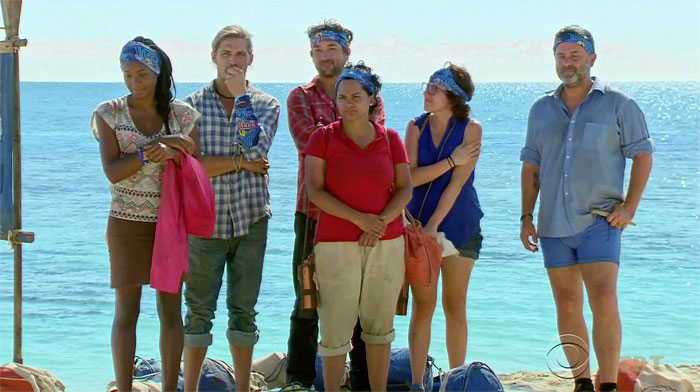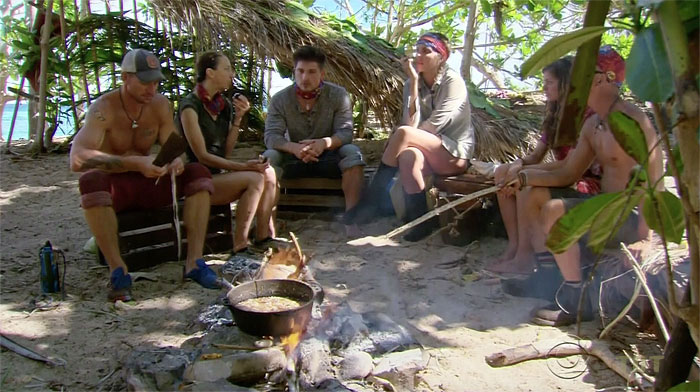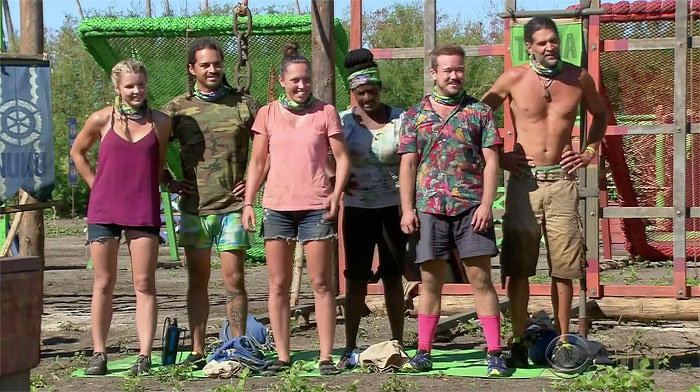

Last week on the social media platform we call Twitter and other sad folks call The Place to Spew Hate, a new reader named Ben Leo asked me if I’ve ever talked about the concept of social norms in this here column. I told him I had once explicitly, but numerous times implicitly.
The more I thought about his question, the more I realized I could probably talk about social norms every week. In a sense, I could really talk about certain theories such as priming or social identity theory or even social learning theory every week. And each season, we’ll get to each of them. Heck, we already talked priming last week. But this week, while watching the tribe swap, I realized this here column could really highlight norms.
Let’s start by saying social norms are certainly not a theory; they’re a concept baked into a lot of theories. I’ve done this once before, but this week I want to discuss organizational theory. Now, there are a whole lot of ways to apply organizational theory, which is really just a way of saying there are a whole lot of ways to conduct organizational analyses. Many scholars who study org theory would say they study organizational communication. In fact, where I work, at the University of Colorado, in the College of Media, Communication and Information, we have one of the better organizational communication programs in the country housed in our Department of Communication.
Fundamentally, people who study organizations can do it numerous ways. While I am in no way an organizational scholar, I have done some work in the area. For example, the retired MIT professor Edgar Schein built a theory of organizational culture based around the idea that nothing is more important in terms of organizational culture than leadership. I did a study highlighting this in newsrooms.
But how does this have to do with social norms and Survivor you’re asking. Well, let’s explain.

So, essentially, producers are applying organizational theory every time they do a tribe swap. Oh, sure, they want to mess up alliances and keep players on their toes, but really they want to change the dynamics within each tribe. Most organizational theories revolve around the idea that organizational culture is shaped by people within the organization; each time those people are changed, the culture will change, at least slightly. Think about your job: Whenever someone, especially a prominent someone, leaves or is replaced, the dynamics of the place change.
And social norms are a big part of this. Social norms are basically informal rules that dictate how we behave. But these are completely arbitrary and made up by us, at some point. Think about tipping. In America, for a variety of reasons, we tip servers at restaurants. And it’s the norm, now, to tip 20%. Whenever I see someone tip less, it makes me feel bad and awkward. But why? This isn’t a law. This is 100% arbitrary. And in, say, Japan, tipping is considered an insult. Are they wrong and we’re right? Of course not. It’s just a social norm.
There are countless social norms that differ not only between countries, but also at businesses or in areas of the country. Heck, at my last professorial job, everyone dressed up. Most of the male professors, for example, wore ties or even full suits. I just can’t do that. Not for me. Here in Colorado, if I wore a tie or a suit daily, I would stick out like a sore thumb.
Even if I wanted to wear I suit, I wouldn’t. Social norms here tell me to behave otherwise.
Every time there’s a tribe swap on Survivor, in essence, new organizations are formed. And when new organizations begin life, they adopt many existing social norms, but they also form new ones too. Think about this week. Almost immediately, both J.T. and Troyzan began searching for idols. Tony did the same thing last week. We know that, for some reason, it’s a social norm not to look for idols openly. People who break this norm are often targeted by the vote. That’s just the way it is.

In the new Mana tribe, Brad was clearly worried that Tai, Caleb and Debbie had already played together and could team up to eliminate him and Sierra. He knew that they shared some social norms and organizational experience. It would be easy for them to fall into old habits and start eliminating the folks they don’t know as well. We’re all tied to social norms that we’ve become accustomed to. It’s hard to get out of our routines.
So Brad decided a new organizational culture was needed. He wanted to lead, but to do it in a far less obtrusive and aggressive manner than he did on Blood vs. Water. And good for him. Brad pulled it off and Caleb went home. Now, we’re going to watch the next few episodes and see how the three new tribes create, in effect, their own new organizations while also adopting some established social norms and making new ones. I’m excited to see what happens.
And we’re off. We had a huge tribe swap this week and it looks like another big twist comes our way next week. With everything we’ve seen, here’s how I view the players right now:
Mana

- Hali — There was a moment during tribal when Brad complimented Hali’s potential skills as a lawyer. I would like to point out that I’ve seen hundreds of episodes of Law and Order, and the amazing Jack McCoy is never monotone. I just don’t think a low-energy monotone person is a trial lawyer. I hope I’m wrong for Hali’s sake.
- Brad — As great as Sandra was taking out Tony – and I feel really weird typing this – there is no doubt in my mind that in the early going, Brad is the MVP of the season thus far. Honestly, he’s been kind of amazing. His work on Tai this week ranks up there with any great move in the series’ history. Oh, wait, it was Tai.
- Sierra — Another week over, and another week where I wish Sierra went home. I don’t mean to be, well, mean, but I’m sticking by my whole least-deserving returnee in history (though I acknowledge 1LostFan’s argument for Amber). She’s doing fine this season, but I can’t get past it...
- Tai — Can I let you guys in on a secret? I want a Survivor spinoff where returnees are put into groups of two with meager, meager food. One group of two? I want Tai and Sandra together with easily catchable goats. Then I want to see what happens. I’d watch that show. I would think the goats and Tai end up dead.
- Debbie — Besides Brad, Debbie looks safest and most in control on Mana. Who would have thunk it? Good for her.
Nuku

- Aubry — This tribe swap will seemingly help Aubry. I mean, being in the majority with an easy vote-off of J.T. should be good for her. On the other hand, I have to think folks like Malcolm and Sandra understand keeping J.T. around is good for them. So maybe Aubry isn’t safer now.
- Michaela — Even though nothing about Michaela fades into the background, I do think some bigger personalities this season are forcing Michaela from the foreground. That’s only a good thing. If Michaela can make a merge, she can do some damage. I’m rooting for her.
- Sandra — Here’s the thing about Sandra, the question she’ll have to answer this season: Does she want to compete to win or does she just want to make sure nobody else becomes a two-time winner? See, the thing with Tony was that it just made sense to keep him around, but Sandra took too much joy in ditching him. Will she be too singularly focused on eliminating J.T.?
- Malcolm — Malcolm, against all odds, survived the biggest curse in all of journalism. Forget the Madden Curse, the Well, In Theory… Winner Pick Curse™ is way worse. And, yet, Malcolm made nine days! Let’s celebrate.
- Jeff — I really feel slighted since Varner did not get an appropriate amount of confessionals this week. What the heck? Let the man talk more.
- J.T. — If there’s one thing J.T. isn’t, I guess, it’s smooth. But while the episode wants us to believe that if Nuku goes to tribal, J.T. is done, I’m not buying it. First, this is a strong tribe, especially when Sandra and Varner can do a puzzle or untie ropes. Second, I’ve got a feeling Aubry is next.
Tavua

- Troyzan — It might have looked kind of clunky on television, but give Troyzan credit for nabbing that idol. Good work. And just the threat of him having it might shake this tribe up a bit. Unlike with J.T., I do think this tribe will attempt to eliminate Troy the first chance they get.
- Andrea — Andrea was Tai-like in her chat with Troyzan, but I still like where she sits within this tribe. You have to think both Troy and Cirie are more on the outs (and maybe Zeke), which leaves Andrea in a good position to make the merge, where she can do some damage.
- Cirie — I’ve still got a bad feeling that we’re going to see Cirie get the boot next week. If two tribes go to tribal, the odds are Tavua is one of them and with Troy’s idol … well, I’m thinking it’s Cirie.
- Sarah — This was a quiet week for Sarah. And she talked a decent amount last week, so I’m thinking she’s safe for a bit. Honestly, she’s seemingly in a perfect place with her tribe. Of course, anything can change quickly.
- Ozzy — I’m still digging Ozzy’s chances. And I still believe that if this dude can make the end, he’ll have a hell of a tale to tell a jury. I mean, he’s still a physical beast and this would make the third time he’s either made the end or came oh so close. I think Ozzy can win. He just needs to get there.
- Zeke — I’m still loving Zeke the player. He always seems so happy to be playing and I can appreciate that. I just think the savvier returnees are going to focus on him since they just don’t know his game.
While this episode might have been a little disappointing on the surface, the optimist in me says, “At least we lost an inconsequential player this week.” It might not make up for the loss of Tony, whom I’m still mourning, but at least Sandra and the like are still around. Next week looks like it could be exciting, so let’s talk then.
 Pat Ferrucci started watching Survivor when Episode Two of Borneo first aired. He's seen every episode since. Besides recapping here, he'll be live-tweeting this season from the Mountain Time Zone. Why? Because nobody cares about the Mountain Time Zone except when they want to ski. Follow him @patferrucci for Survivor stuff and tweets about anything and everything that enters his feeble mind.
Pat Ferrucci started watching Survivor when Episode Two of Borneo first aired. He's seen every episode since. Besides recapping here, he'll be live-tweeting this season from the Mountain Time Zone. Why? Because nobody cares about the Mountain Time Zone except when they want to ski. Follow him @patferrucci for Survivor stuff and tweets about anything and everything that enters his feeble mind.
- S34 Well, in theory... index
- Cast: And the winner? I don't know?
- Eps.1-2: This cast is sure primed for fun
- Ep.3: Organize differently and boom, different culture
- Ep.4: Producers innovate, but it's unfortunately disruptive
- Ep.5: To compare or not to compare
- Ep.6: The drive to boot Sandra
- Ep.7: With the merge comes power rankings
- Eps.8-9: Booting Hali the rational choice
- Ep.10: Sarah revolts against dominance
- Ep.11: Don't rock the boat - we like it stable
- Ep.12: Do it and do it swiftly
- Ep.13: Where do we stand? A look at the Final 6
- Pre-Ep.14: Jury jeopardy